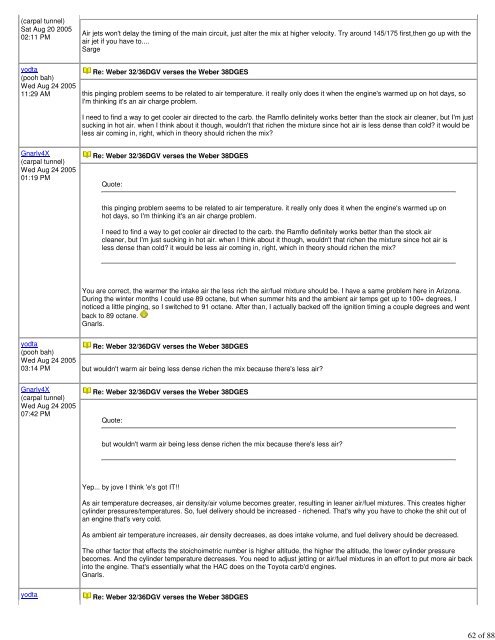You also want an ePaper? Increase the reach of your titles
YUMPU automatically turns print PDFs into web optimized ePapers that Google loves.
(carpal tunnel)<br />
Sat Aug 20 2005<br />
02:11 PM<br />
yodta<br />
(pooh bah)<br />
Wed Aug 24 2005<br />
11:29 AM<br />
Gnarly4X<br />
(carpal tunnel)<br />
Wed Aug 24 2005<br />
01:19 PM<br />
yodta<br />
(pooh bah)<br />
Wed Aug 24 2005<br />
03:14 PM<br />
Gnarly4X<br />
(carpal tunnel)<br />
Wed Aug 24 2005<br />
07:42 PM<br />
Air jets won't delay <strong>the</strong> timing of <strong>the</strong> main circuit, just alter <strong>the</strong> mix at higher velocity. Try around 145/175 first,<strong>the</strong>n go up with <strong>the</strong><br />
air jet if you have to....<br />
Sarge<br />
Re: <strong>Weber</strong> <strong>32</strong>/<strong>36DGV</strong> <strong>verses</strong> <strong>the</strong> <strong>Weber</strong> <strong>38DGES</strong><br />
this pinging problem seems to be related to air temperature. it really only does it when <strong>the</strong> engine's warmed up on hot days, so<br />
I'm thinking it's an air charge problem.<br />
I need to find a way to get cooler air directed to <strong>the</strong> carb. <strong>the</strong> Ramflo definitely works better than <strong>the</strong> stock air cleaner, but I'm just<br />
sucking in hot air. when I think about it though, wouldn't that richen <strong>the</strong> mixture since hot air is less dense than cold? it would be<br />
less air coming in, right, which in <strong>the</strong>ory should richen <strong>the</strong> mix?<br />
Re: <strong>Weber</strong> <strong>32</strong>/<strong>36DGV</strong> <strong>verses</strong> <strong>the</strong> <strong>Weber</strong> <strong>38DGES</strong><br />
Quote:<br />
this pinging problem seems to be related to air temperature. it really only does it when <strong>the</strong> engine's warmed up on<br />
hot days, so I'm thinking it's an air charge problem.<br />
I need to find a way to get cooler air directed to <strong>the</strong> carb. <strong>the</strong> Ramflo definitely works better than <strong>the</strong> stock air<br />
cleaner, but I'm just sucking in hot air. when I think about it though, wouldn't that richen <strong>the</strong> mixture since hot air is<br />
less dense than cold? it would be less air coming in, right, which in <strong>the</strong>ory should richen <strong>the</strong> mix?<br />
You are correct, <strong>the</strong> warmer <strong>the</strong> intake air <strong>the</strong> less rich <strong>the</strong> air/fuel mixture should be. I have a same problem here in Arizona.<br />
During <strong>the</strong> winter months I could use 89 octane, but when summer hits and <strong>the</strong> ambient air temps get up to 100+ degrees, I<br />
noticed a little pinging, so I switched to 91 octane. After than, I actually backed off <strong>the</strong> ignition timing a couple degrees and went<br />
back to 89 octane.<br />
Gnarls.<br />
Re: <strong>Weber</strong> <strong>32</strong>/<strong>36DGV</strong> <strong>verses</strong> <strong>the</strong> <strong>Weber</strong> <strong>38DGES</strong><br />
but wouldn't warm air being less dense richen <strong>the</strong> mix because <strong>the</strong>re's less air?<br />
Re: <strong>Weber</strong> <strong>32</strong>/<strong>36DGV</strong> <strong>verses</strong> <strong>the</strong> <strong>Weber</strong> <strong>38DGES</strong><br />
Quote:<br />
but wouldn't warm air being less dense richen <strong>the</strong> mix because <strong>the</strong>re's less air?<br />
Yep... by jove I think 'e's got IT!!<br />
As air temperature decreases, air density/air volume becomes greater, resulting in leaner air/fuel mixtures. This creates higher<br />
cylinder pressures/temperatures. So, fuel delivery should be increased - richened. That's why you have to choke <strong>the</strong> shit out of<br />
an engine that's very cold.<br />
As ambient air temperature increases, air density decreases, as does intake volume, and fuel delivery should be decreased.<br />
The o<strong>the</strong>r factor that effects <strong>the</strong> stoichoimetric number is higher altitude, <strong>the</strong> higher <strong>the</strong> altitude, <strong>the</strong> lower cylinder pressure<br />
becomes. And <strong>the</strong> cylinder temperature decreases. You need to adjust jetting or air/fuel mixtures in an effort to put more air back<br />
into <strong>the</strong> engine. That's essentially what <strong>the</strong> HAC does on <strong>the</strong> Toyota carb'd engines.<br />
Gnarls.<br />
yodta Re: <strong>Weber</strong> <strong>32</strong>/<strong>36DGV</strong> <strong>verses</strong> <strong>the</strong> <strong>Weber</strong> <strong>38DGES</strong><br />
62 of 88


